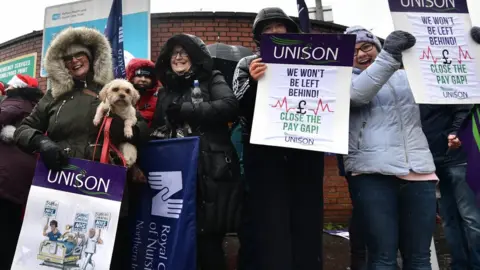Industrial action by health workers in NI begins
 Pacemaker
PacemakerHealthcare workers from two of Northern Ireland's biggest unions have begun industrial action in a dispute about pay.
Nipsa members started "indefinite action short of strike" on Monday.
Unison members are taking similar action on Monday and will follow that with a one-day strike on 12 December.
Those unions announced their action after the Royal College of Nursing said its members would strike on 15 and 20 December.
Nipsa members are taking the action over three issues: pay, staffing levels within the health service and travel reimbursement.
Unison's action is over pay for its members.
Health workers in Northern Ireland have yet to receive an increase in pay for the 2022-23 financial year.
In July an independent pay review body recommended that they should receive a rise of £1,400.
Unison representative Anne Speed told BBC News NI's Good Morning Ulster programme the union was seeking an "inflation-busting pay rise" for its members.
"What it means is inflation is 11%, and a pay rise actually has to match that in order to protect workers," she said.
"What's being awarded is only half of inflation, and health workers are just frustrated, fed up, very disappointed and they're choosing to speak out now."
Ms Speed added that unions were prepared to negotiate, but the responsibility fell on Northern Ireland Secretary Chris Heaton-Harris, due political stalemate at Stormont.
The Democratic Unionist Party (DUP) withdrew from the executive earlier this year in protest over the Northern Ireland Protocol, which is part of the Brexit deal.
In England and Wales, NHS staff have been given a rise of at least £1,400.
Unions in Scotland are considering a government offer averaging 7.5%.


There are several reasons why workers are taking industrial action, including the failure by the Stormont executive to trigger a pay increase while the cost of living soars.
Workers in the Unison and Nipsa unions want staff shortages addressed and feel their efforts during the pandemic should be recognised financially.
It will take a lot to resolve the industrial dispute.
But the unions say that for starters, in the absence of devolved government, civil servants could agree to pay workers the recommended rate that has been granted elsewhere.

The Nipsa and Unison action will take the form of work to rule - members will only take on work required in their contracts.
Nipsa deputy general secretary Pádraig Mulholland said those who were taking the action were the "heroes who brought us through Covid and are now standing up for the health service".
He said that during the action members would:
- Only work paid hours
- Not do unpaid work
- Not cover vacant posts from five days after they become vacant
- Not cover long-term sick lasting over four weeks
- Take all of their normal breaks
Unison said its members were frustrated and angry and "are now the lowest paid part of the UK NHS workforce".
The union said the cost-of-living crisis was biting deep and it was foolish to assume workers would "suck it up".
Regarding the strike planned for 12 December, Unison said employers would be advised in the coming days of the full scope of the action.
In a joint statement the unions said the safety of health service patients was "very important for health staff who will take industrial action".
"Discussions have already begun to ensure the employers take the necessary steps to protect patients during the dispute," they said.
Stormont's Department of Health said the health authorities would work to protect critical services as much as possible during the industrial action.
But it warned that there would "inevitably be an impact on patient care".
Health staff in Northern Ireland last went on strike in late 2019 and early 2020 in protest over pay and staffing levels.
